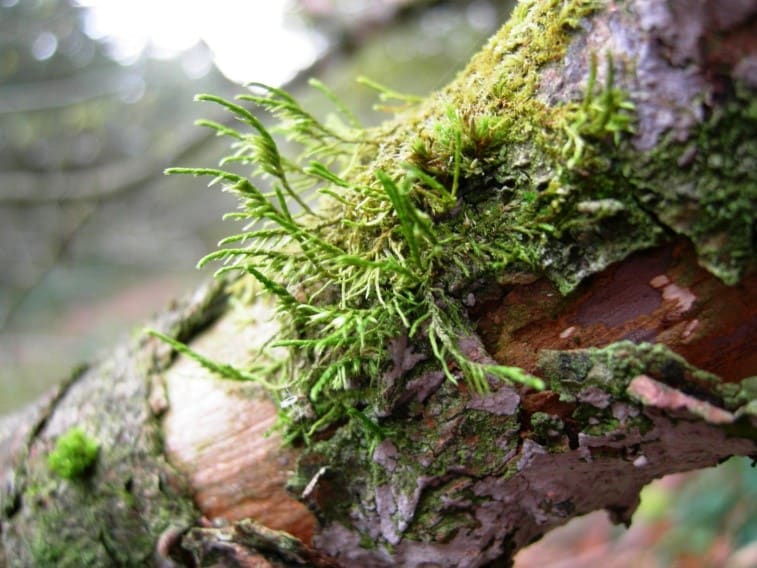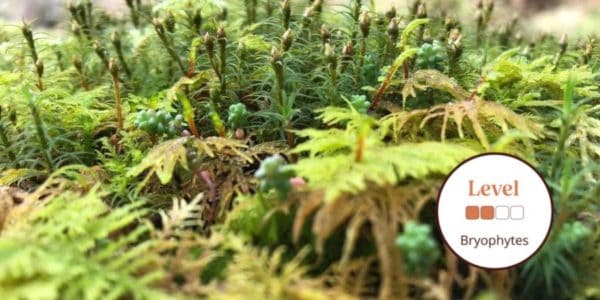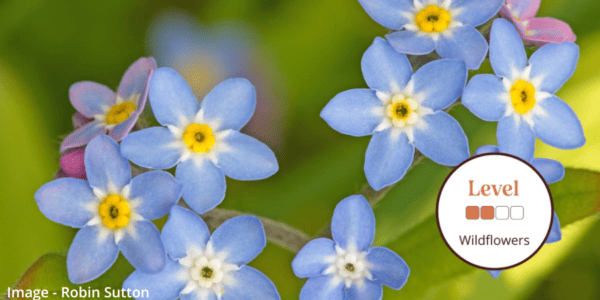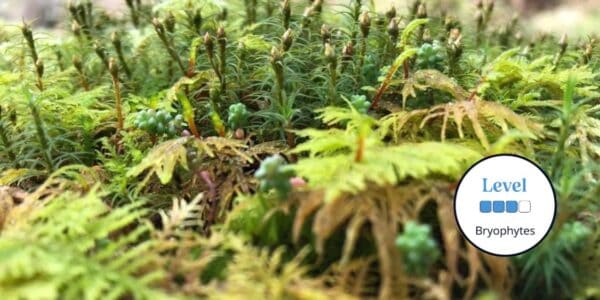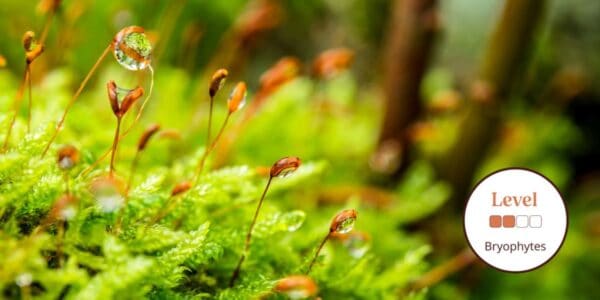This beginner online course will introduce you to the complex world of mosses, liverworts and hornworts, collectively known as bryophytes.
Have you ever wondered what makes up the bright green carpets on rocks and trees? If you take a closer look, a diverse and prehistoric world is revealed. With over half of all European Bryophyte species present in the UK there is so much to explore!
This course is a gentle introduction to bryophytes, which can be quite a complicated group to first begin with. The course covers their biology, ecology and where you can find them. There are plenty of opportunities for you to get outside and put your newfound knowledge into practice, alongside guidance from an expert tutor and other learners. The course is at a beginner level due to the nature of this group and is a great place to start for those with a botanical interest who are thinking about taking their first steps into the world of Bryophytes.
This is a 4-week online course covering 4 topics, for which you will complete a variety of self-led online resources and activities. Each topic is then concluded with either an interactive Zoom workshop or marked assignment to complement the online content. Time commitment is approximately 2-3 hours a week and an E-certificate is provided upon completion. Understand how our online courses are delivered.
Who Should Attend?
Nature enthusiasts, Students, Rangers, Early career ecologists.
Knowledge Level
Beginner. Level descriptors can be found on the following webpage: Framework and Course Level Descriptors
Prior Knowledge
Existing knowledge and understanding of basic plant terminology would be beneficial for this course.
Recommended Devices
It is recommended that you access your course through a PC or laptop. Please be aware that there will be reduced functionality if you decide to access the course through a tablet or smartphone. The Field Studies Council is unable to email content directly to you.
What is covered in this course?
-
- What are Bryophytes?
- Bryophyte Biology
- Bryophyte Ecology
- Finding Bryophytes in their Natural Environment
Please note that this is NOT a species identification course
By the end of the course, you will be able to:
-
- Describe which groups of organisms are classified as bryophytes and what makes them different from all other plants
- Understand the basics of bryophyte lifecycles and reproductive strategies and structures
- Describe bryophyte habitats and their environmental conditions
- Recognise groups of common bryophytes in their natural environments
- Share this knowledge with friends, family and fellow volunteers.
This is a training course from the Field Studies Council, including online course materials, expert tuition and a flexible learning style. After attending this course, you may like to progress your learning about bryophytes with further relevant courses, or branch out into other areas of the plant kingdom. The Field Studies Council offers both online and in person courses, so you can choose the learning style that suits you best.
Please note that bookings will close at 9 am on Friday 28th October to allow for all participants to be enrolled to the online platform – booking will not be taken after this time.*
* Bookings will close sooner if course capacity is reached
The course gives you the opportunity to immerse yourself in a new subject and acquire novel skills. Our online portal gives you time to study at your own pace and fit the lessons around your own schedule.
-
- See the ‘Example Timetable’ and ‘What’s Included’ sections below for more information about this course.
- Each individual needs to place their own order to ensure we can sign you up to the learning platform and give you access to resources.
- If you have any questions about our online courses please check our Frequently Asked Questions first
- If your question is still not answered, email [email protected]
Group Bookings Made Easy
If you have a group of 10 or more individuals wanting to complete one of our courses, our team are available to discuss your options – from discounts to private team courses.
-
- Discounted rates
- Privately run courses for your group
- Bespoke courses developed specifically for your needs
Tutor: Lucia Ruffino
Lucia Ruffino is a bryologist and free-lance botanical surveyor living and working in North Wales. Lucia’s botanical knowledge has developed over the years from an amateur background and she now specialises in NVC surveys in upland and peatland habitats.Live Webinar Information
The webinars will take place on the following dates at 6:00 pm (GMT):
-
- Wednesday 9th November 2022 at 6:00 - 6:45 pm
- Wednesday 16th November 2022 at 6:00 - 6:45 pm
- Wednesday 23rd November 2022 at 6:00 - 6:45 pm
For Week 4 there will be a marked assignment in which the course tutor will provide feedback on your submission.
Please note - webinars will be recorded and uploaded to the virtual learning platform for learners unable to attend.
Example Timetable
Timetable
Week 1: What are bryophytes?
Self-study material available: 02/11/2022
Week 1 live webinar: 09/11/2022 at 6:00 pm
Week 2: Bryophyte biology
Self-study material available: 09/11/2022
Week 2 live webinar: 16/11/2022 at 6:00 pm
Week 3: Bryophyte ecology
Self-study material available: 16/11/2022
Week 3 live webinar: 23/11/2022 at 6:00 pm
Week 4: Finding bryophytes in their natural environment
Self-study material available: 23/11/2022
Week 4 marked assignment due*: 30/11/2022 at 6:00 pm
*For Week 4 there will be a marked assignment in which the course tutor will provide feedback on your submission.
The final deadline to complete any outstanding activities and self-study components is 14/12/2022
Time commitment: This course will require approximately 2-3 hours of your time each week. This includes covering course materials on our Moodle learning platform and the Zoom session.
What's Included
The course has been carefully created to help you continue to build and develop your knowledge as the course progresses. With content crafted to the online Moodle Platform and bespoke to the Field Studies Council.
The course includes:
-
- 45-minute interactive weekly Zoom workshops to connect with the tutor and other participants
- Expert tuition for which the Field Studies Council is renowned
- Activities to work on independently in advance of each Zoom workshop
- Tailored course completion certificate
Once registered, you will follow well-illustrated, user-friendly ’books’ to pick up knowledge. Quizzes and skill checks will give you instant feedback on your learning. Forums give students the chance to interact with each other as well as a place to share work.
You can rest assured that the absolute best content from an expert in environmental education will be at your fingertips. In choosing a Field Studies Council course, you will be joining thousands of people who learn with us each year.
Before You Attend
Accessing Your Course
- Once you sign up you’ll receive an email at least 24 hours in advance of the course opening with details of how to access our easy-to-use platform, Moodle.
- Moodle can be accessed through a browser or an app.
- Webinars are via Zoom so you won’t need any new software to attend
Recommended Devices
It is recommended that you access your course through a PC or laptop. Please be aware that there will be reduced functionality if you decide to access the course through a tablet or smartphone. The Field Studies Council is unable to email content directly to you.
Recommended Equipment
The following is not mandatory but will help you within this course:
-
- Hand lens
- Wildflower Identification guide - Recommended: The Wild Flower Key by Francis Rose or Collins Wildflower Guide by David Streeter
Sorry this course booking is closed

